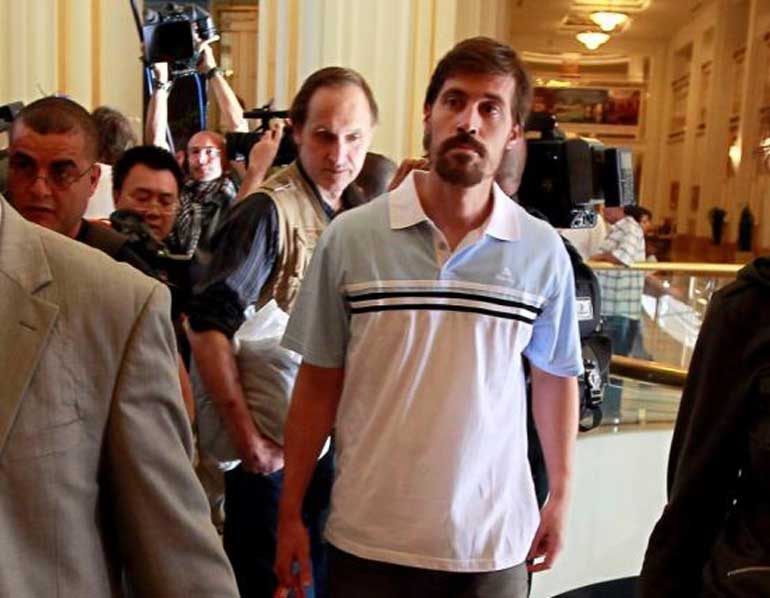Wednesday Feb 18, 2026
Wednesday Feb 18, 2026
Monday, 16 November 2015 00:00 - - {{hitsCtrl.values.hits}}
 U.S. journalist James Foley (R) arrives with fellow reporter Clare Gillis (not pictured), after being released by the Libyan government, at Rixos hotel in Tripoli, in this picture taken 18 May, 2011 – Reuters
U.S. journalist James Foley (R) arrives with fellow reporter Clare Gillis (not pictured), after being released by the Libyan government, at Rixos hotel in Tripoli, in this picture taken 18 May, 2011 – Reuters
News that the Islamic State militant known as “Jihadi John” had apparently died in a US air strike brought relief mingled with fresh grief on Friday to the loved ones of the Western aid workers and journalists he allegedly killed on video.
But beyond the emotional impact, experts on extremism questioned whether the demise of Mohammed Emwazi, a Kuwaiti-born Briton who came to symbolise the brutality of Islamic State, would signify real progress in the fight against the group.
Emwazi was described as Islamic State’s “lead executioner” by British Prime Minister David Cameron following the strike, which came a year after US President Barack Obama promised justice after the deaths of American hostages.
Relatives and friends of the victims expressed sometimes conflicting thoughts and emotions.
John and Diane Foley, the parents of American journalist James Foley, repeated criticism they aimed at the US Government after their 40-year-old son was killed in August 2014.
“It is a very small solace to learn that Jihadi John may have been killed by the US Government. His death does not bring Jim back,” they said in a statement. “If only so much effort had been given to finding and rescuing Jim and the other hostages who were subsequently murdered by ISIS, they might be alive today,” they added, using an acronym for Islamic State.
That was echoed by the parents of American aid worker Steven Sotloff, 31, who was beheaded shortly after Foley’s execution was widely circulated on the Internet.
“This development doesn’t change anything for us; it’s too little too late,” Art and Shirley Sotloff said in a statement. “Our son is never coming back.”
Relatives of two British aid workers, Alan Henning and David Haines, who were killed after Foley and Sotloff, said they took some comfort from Emwazi’s likely death.
“After seeing the news that ‘Jihadi John’ was killed I felt an instant sense of relief, knowing he wouldn’t appear in any more horrific videos,” Bethany Haines, Haines’ teenage daughter, told ITV News.
“As much as I wanted him dead, I also wanted answers as to why he did it, why my Dad, how did it make a difference.”
Reg Henning, brother of Alan, told the BBC: “I was glad to hear he had been killed, but I would have preferred him to have been brought to justice.”
Highlighting the gruesome impact of Emwazi’s propaganda videos, Alan Henning’s 18-year-old daughter Lucy disclosed on a TV chat show that she first found out her father had been killed when she saw a picture of his body on Instagram.
“It was the final picture, after the execution,” Lucy Henning said on the ITV show, which was filmed before news of Emwazi’s likely death. “I try not to think about them,” she said of Islamic State militants. “I think I’m still numb.”
Junko Ishido, the mother of executed Japanese journalist Kenji Goto, 47, called for peace following the strike targeting Emwazi.
“I only wish there will be no more conflicts like these in this world, as my son had hoped to see peace prevail around the world,” Ishido told Japanese public news service NHK.
“The right thing to do”?
Beyond the circle of those whose relatives were killed, there was unanimous condemnation of Emwazi but also concerns over the manner of his reported death.
“It appears Mohammed Emwazi has been held to account for his callous and brutal crimes. However, it would have been far better for us all if he had been held to account in a court of law,” said Jeremy Corbyn, leader of Labour, the main British opposition party.
White House Press Secretary Josh Earnest said the strike demonstrated that advances are being made against Islamic State. Asked about the Foley family’s criticism, he said, “I think their reaction is perfectly understandable.”
Cameron praised the action as “the right thing to do.” Calling Henning and Haines the “best of British,” he said in a solemn statement outside his Downing Street office that Britain had acted “hand in glove” with the Americans and it was “an act of self-defence.”
Mohammed Shafiq, chief executive of the Ramadhan Foundation, one of Britain’s leading Muslim organisations, said it would have been better if Emwazi had been captured and tried, but he understood why this was not possible.
“Extra-judicial killing over justice in a court of law should not become the norm in the fight against terrorism,” he said in a statement.
Some experts said Emwazi’s death would be symbolically important but unlikely to make much difference to Islamic State or to the struggle against radicalisation among some young British Muslims.
“Islamic State will survive ‘Jihadi John’,” said Jonathan Russell, political liaison officer at the Quilliam Foundation, which aims to debunk the belief systems of Islamic extremism.
“If we’re going to make any sort of progress on winning this global war against Jihadism, we’ve got to focus on the ideology and win the battle of ideas, not just have a look at their propaganda tools and their frontmen and their symbols.”
Peter Neumann, director of the International Centre for the Study of Radicalisation at King’s College London, said Emwazi’s fate would help undermine Islamic State’s image of invincibility.
“He was not a senior military figure within ISIS so the military impact on the ground will be small, but the symbolic impact is of course significant. It feeds into a wider narrative that ISIS in its core territory isn’t really winning anymore.”